
ENVIRONMENTAL SCIENCE & TECHNOLOGY
Scope & Guideline
Pioneering the intersection of science and technology for a greener future.
Introduction
Aims and Scopes
- Environmental Chemistry and Toxicology:
Research on the chemical composition, behavior, and toxicological effects of environmental pollutants, including persistent organic pollutants (POPs), heavy metals, and emerging contaminants like PFAS. - Water Treatment and Management:
Studies related to innovative methods for water purification, wastewater treatment technologies, and the assessment of chemical contaminants in water resources. - Air Quality and Atmospheric Science:
Investigations into atmospheric chemistry, including the formation and impact of secondary organic aerosols, gas-phase reactions, and the sources and effects of airborne pollutants. - Soil and Sediment Contamination:
Research focused on the understanding of soil and sediment contamination dynamics, including the bioavailability of pollutants and their impacts on ecosystems. - Sustainable Resource Management:
Exploration of sustainable practices in waste management, recycling, and the circular economy, emphasizing the recovery of valuable materials from waste streams. - Climate Change and Environmental Justice:
Analysis of the impacts of climate change on ecosystems and human health, along with studies addressing environmental justice and equity in environmental policy. - Microbial Ecology and Bioremediation:
Research on microbial processes in environmental contexts, including the use of microbes for bioremediation and the interactions between microorganisms and pollutants.
Trending and Emerging
- Per- and Polyfluoroalkyl Substances (PFAS) Research:
There is a significant increase in studies investigating the sources, effects, and remediation of PFAS, emphasizing the urgent need to address these persistent pollutants in various ecosystems. - Microplastics and Their Environmental Impact:
Research on microplastics is rapidly growing, focusing on their sources, transport mechanisms, and ecological effects, highlighting the need for solutions to mitigate their impact on the environment. - Innovative Water Treatment Technologies:
Emerging studies emphasize novel water treatment technologies, including electrochemical processes and advanced oxidation, to effectively remove contaminants from water sources. - Machine Learning and Data Science Applications:
The integration of machine learning and data science in environmental research is on the rise, facilitating more accurate predictions, data analysis, and management strategies. - Climate Change Mitigation Strategies:
Research is increasingly focused on strategies for mitigating climate change, including carbon capture technologies, sustainable agriculture, and the assessment of greenhouse gas emissions. - Health Impacts of Environmental Exposures:
Growing attention is being paid to the health impacts of environmental pollutants, particularly in vulnerable populations, linking environmental science with public health. - Ecosystem Services and Biodiversity Conservation:
There is an emerging trend towards understanding the role of ecosystem services in conservation efforts and their importance for sustainable development and human well-being.
Declining or Waning
- Traditional Environmental Monitoring:
There is a noticeable decline in studies focused solely on traditional environmental monitoring techniques, as the field shifts toward more innovative, integrated approaches utilizing advanced technologies like machine learning and remote sensing. - Chemical Engineering Approaches:
Research that primarily emphasizes traditional chemical engineering methods without incorporating sustainability or environmental impact assessments has seen reduced publication rates, as the journal increasingly prioritizes holistic and sustainable solutions. - Conventional Waste Management Practices:
The focus on conventional waste management strategies, such as landfilling and incineration, is diminishing in favor of more sustainable practices, including resource recovery and circular economy principles. - Basic Ecological Studies:
Basic ecological studies without direct relevance to environmental technology or policy implications are appearing less frequently, reflecting a shift towards applied research with immediate societal benefits.
Similar Journals

International Journal of Environmental Science and Technology
Advancing solutions for a sustainable future.International Journal of Environmental Science and Technology, published by SPRINGER, stands as a premier platform for the dissemination of cutting-edge research in the fields of environmental science, technology, and engineering. With an impressive scope spanning from 2005 to 2024, this journal serves as a vital resource for academic and professional communities engaged in tackling pressing environmental challenges. It boasts a strong reputation, evidenced by its Q1 ranking in Agricultural and Biological Sciences and solid placements in Environmental Chemistry and Engineering. Researchers searching for high-impact studies will find the journal's contributions significant, as reflected in its rankings within Scopus: 34th percentile in Agricultural and Biological Sciences and notable standings in Environmental Engineering and Chemistry. Although the journal is not currently an Open Access resource, it maintains a commitment to academic rigor and innovation, making it indispensable for those devoted to advancing knowledge in environmental sustainability and technology.

Pollution
Unveiling the complexities of pollution for global change.Pollution is a distinguished open-access journal published by UNIV TEHRAN, dedicated to advancing the understanding of environmental science and the multifaceted aspects of pollution research. Since its establishment in 2015, the journal has been committed to disseminating high-quality, peer-reviewed articles that address the pressing issues of environmental degradation globally. With an impact factor and a Scopus rank that places it within the top tier of Environmental Science (Rank #141/233), Pollution serves as an essential resource for researchers, professionals, and students alike. The journal encompasses a wide range of topics, including the sources, effects, and mitigation strategies related to various forms of pollution, thereby aiming to contribute significantly to the scientific community's efforts in promoting environmental sustainability. Its innovative and timely approach positions Pollution as a vital platform for sharing knowledge and fostering interdisciplinary collaboration in the environmental science domain.
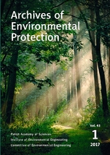
Archives of Environmental Protection
Unveiling the Complexities of Environmental ProtectionArchives of Environmental Protection, published by the Polish Academy of Sciences, is a pivotal journal in the field of Environmental Science. With an ISSN of 2083-4772 and E-ISSN of 2083-4810, this journal serves as a critical platform for disseminating innovative research and comprehensive reviews that address the complexities surrounding environmental issues. As of 2023, it holds a respectable Q3 ranking in Environmental Science, reflecting its relevance and contribution to the academic community, indicated by a Scopus rank of 124 out of 233 in the General Environmental Science category. Although it operates without Open Access, the journal's consistent publication from 2007 to 2024 emphasizes its commitment to advancing knowledge in diverse areas of environmental protection. Researchers, professionals, and students are encouraged to engage deeply with the wealth of insights offered through the rigorous peer-reviewed articles presented in this journal, which strive to foster sustainable practices and environmental stewardship.
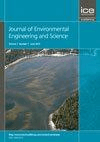
Journal of Environmental Engineering and Science
Advancing Research at the Intersection of Engineering and EcologyJournal of Environmental Engineering and Science, published by Emerald Group Publishing Ltd, is a prominent academic platform dedicated to the dissemination of cutting-edge research in the fields of environmental engineering, chemistry, and science. This journal, with ISSN 1496-2551 and E-ISSN 1496-256X, features a comprehensive collection of studies that delve into innovative methodologies and practical applications aimed at solving pressing environmental issues. Having been published since 2002, it spans critical research years from 2015 to 2024, offering insights that are invaluable to both academics and practitioners alike. With its current rankings placing it in the fourth quartile for Environmental Chemistry and Engineering, and the third quartile in miscellaneous Environmental Science, the journal serves as a significant yet under-utilized resource for emerging scholars seeking to contribute to the ecological discourse. Though it does not offer Open Access, the content is meticulously curated to uphold academic rigor, catering especially to researchers, professionals, and students keen on advancing their understanding of environmental challenges and engineering solutions.
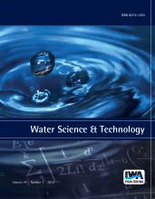
WATER SCIENCE AND TECHNOLOGY
Pioneering advancements in environmental engineering and water resource management.WATER SCIENCE AND TECHNOLOGY, published by IWA PUBLISHING, is a leading academic journal dedicated to advancing the field of water science and technology. With a rich history dating back to 1970, the journal provides a platform for innovative research and technological advancements, catering to the vital challenges faced within the realms of environmental engineering and water resource management. As evidenced by its strong ranking in Scopus, where it holds a position of #86 in Water Science and Technology and #77 in Environmental Engineering, the journal exemplifies significant scholarly contributions, reflected in its Q2 quartile status in both categories as of 2023. Although not an open access journal, WATER SCIENCE AND TECHNOLOGY ensures that its articles are widely available to researchers, professionals, and students passionate about sustainable water solutions. With a continued commitment to excellence, this journal plays a crucial role in shaping the discourse surrounding water quality, conservation, and technology innovation, making it an essential resource for all stakeholders in this critical field.
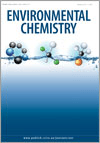
Environmental Chemistry
Exploring the Intersections of Chemistry and EnvironmentEnvironmental Chemistry, published by CSIRO PUBLISHING, is a pivotal journal in the field of environmental studies, focusing on the intricate relationships between chemical processes and environmental systems. With an ISSN of 1448-2517 and an E-ISSN of 1449-8979, this journal serves as a vital resource for researchers, professionals, and students alike, aiming to deepen their understanding of environmental chemistry. The journal, which spans the period from 2004 to 2024, boasts respectable rankings, including a Q2 categorization in both Chemistry (miscellaneous) and Geochemistry and Petrology, alongside a Q3 ranking in Environmental Chemistry for 2023. With a focus on publishing high-quality research that addresses pressing environmental challenges, Environmental Chemistry continues to make significant contributions to the field, fostering advancements in sustainable practices and innovative solutions. Researchers are encouraged to explore this journal's comprehensive archive for cutting-edge studies and discussions that are imperative for the future of environmental health and policy.

JOURNAL OF SOILS AND SEDIMENTS
Pioneering Research in Soil and Sediment InteractionsJOURNAL OF SOILS AND SEDIMENTS, published by SPRINGER HEIDELBERG, stands as a premier interdisciplinary platform dedicated to advancing the understanding of soil and sediment dynamics within the broader context of Earth sciences. With an impressive impact factor and a Q1 ranking in both Earth-Surface Processes and Stratigraphy, this journal not only reflects the high quality of research but also contributes significantly to the dialogue amongst researchers, professionals, and students in the field. The journal encompasses a wide spectrum of topics from sedimentology to soil science, making it essential reading for those involved in environmental management, agriculture, and geology. Access options are available to ensure that cutting-edge research is accessible to a global audience, reflecting the journal's commitment to fostering collaboration and innovation. As we converge towards 2024, JOURNAL OF SOILS AND SEDIMENTS aims to continue its role in shaping scientific inquiry and policy formulation concerning the vital roles of soils and sediments in ecological and geological systems.
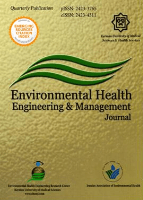
Environmental Health Engineering and Management Journal
Empowering Research to Combat Environmental ChallengesEnvironmental Health Engineering and Management Journal is a premier platform dedicated to the dissemination of research findings in the essential field of environmental health. Published by Kerman University of Medical Sciences in Iran, this Open Access journal has been a beacon of scientific inquiry since its inception in 2014. With an ISSN of 2423-3765 and E-ISSN 2423-4311, it facilitates broad accessibility to cutting-edge research that addresses the complex interactions between environmental factors and human health. With a notable categorization in the Q3 quartile for Environmental Science and Public Health, alongside Q4 in Chemical Health and Safety, the journal underscores its commitment to quality and relevance. Currently ranked #132 out of 233 in Environmental Science within Scopus, it serves as a crucial resource for researchers and practitioners striving to tackle contemporary environmental challenges. The journal's scope includes innovative methodologies, environmental risk assessment, and sustainable health practices, positioning it as an indispensable reference for those invested in improving public health outcomes through environmental engineering and management.

Soil and Water Research
Pioneering Research at the Intersection of Soil and WaterSoil and Water Research, an esteemed journal published by the Czech Academy Agricultural Sciences, is dedicated to advancing the fields of Aquatic Science and Soil Science. With a strong commitment to open access since 2006, this journal facilitates the dissemination of high-quality research and fosters global collaboration among researchers, professionals, and students. Operating from the vibrant academic hub of Prague, Czech Republic, it serves as a key resource for those interested in pressing environmental and agricultural challenges. Featuring a robust H-index and ranking in the Q2 category for both Aquatic Science and Soil Science as of 2023, Soil and Water Research occupies a prominent position in Scopus, ensuring that published works reach a wide audience. The journal invites contributions that explore innovative methodologies and provide insights into soil and water management practices, thus playing a critical role in addressing sustainability issues within these interconnected domains. As researchers navigate the complexities of climate change and resource management, Soil and Water Research stands out as a vital tool for informed decision-making and impactful research.
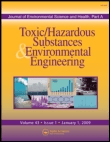
JOURNAL OF ENVIRONMENTAL SCIENCE AND HEALTH PART A-TOXIC/HAZARDOUS SUBSTANCES & ENVIRONMENTAL ENGINEERING
Innovating solutions for environmental safety and human well-being.JOURNAL OF ENVIRONMENTAL SCIENCE AND HEALTH PART A-TOXIC/HAZARDOUS SUBSTANCES & ENVIRONMENTAL ENGINEERING, published by TAYLOR & FRANCIS INC, stands at the forefront of research in the dynamic fields of environmental science and public health. With an ISSN of 1093-4529 and an E-ISSN of 1532-4117, this journal serves as a pivotal platform for disseminating significant findings regarding toxic substances and their impact on the environment and human health. It is categorized in the Q3 quartile for both Environmental Engineering and Medicine in 2023, showcasing its relevance within these disciplines. Researchers will find valuable insights in the 90th rank among 197 in the Environmental Science and Engineering category, placing it in the 54th percentile among its peers. While access options remain traditional rather than open-access, the journal is dedicated to serving as an essential resource for professionals and academics engaged in understanding the intricate connections between hazardous materials and environmental safety. The journal has consistently published critical research since its inception in 1978 and is committed to advancing knowledge up to 2024, making it a crucial venue for ongoing discussions and developments in environmental health.